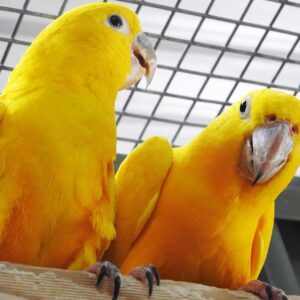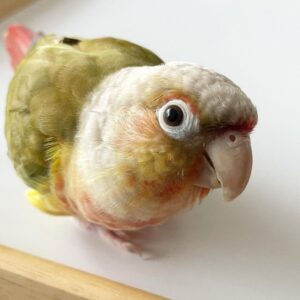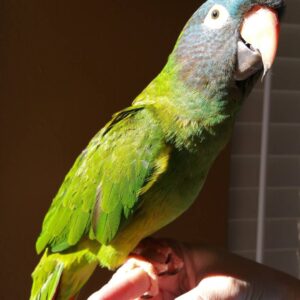Because of its beautiful plumage, great personality, and great companion bird qualities, the sun conure is one of the most beloved conures of its size. Sun conures are stunning birds that stand out for their vivacious personalities, expressive singing, and large beaks. The sun conure, which measures about 12 inches long, is distinguishable by its brilliant yellow and orange plumage that occasionally has green patches.
The sun conure is a popular pet bird because it is amiable, full of personality, and has brilliant colors. These parrots are great companions for families thanks to their intelligence, trainability, and playful attitudes.
This medium-sized Sun Conure for sale parrot is among the noisiest of its kind, so owners should brace themselves. While conures are wonderful companions, they aren’t the best choice for first-time pet owners due to the high level of commitment required for daily engagement, socializing, and training.
Care
The sun conure enjoys playing outside of its cage and isn’t any messier than smaller birds. The sunny bird loves nothing more than to be the center of attention whenever its owner is around. If its owners pay close attention to both birds, the pet sun conure will accept another bird as a “comrade” and retain its lovable personality. It is not possible to breed this Aratinga, but it can be coupled with other Aratingas, such as jendays, mitreds, nandays, gold-cappeds, blue-crowneds, or any other Aratinga. These birds should only ever be friends. Hybridization taints the already limited gene pool, which is why some breeders develop “Sundays” or “Jensuns”—not encouraged.
Feeding a Sun Conure
Sun conures’ natural diet consists mostly of seeds, nuts, and fruit. They thrive on a specially prepared pellet diet that includes fruits, greens, and root vegetables when kept in captivity. Your pet conure will thrive on a little steamed sweet potato.
This pellet food should make up about 75–80% of the bird’s daily intake. Servings of fresh produce should range from one-eighth to one-fourth cup each morning and evening.
Make sure the treats you give a sun conure are nutritious, as they are much like any other pet bird. When indulging in a snack, nuts and seeds are a safe bet. Two great options are almonds and walnuts. A grain-baked casserole dish can be a great help when feeding your feathery friend. This makes a great portioned supper for your bird and freezes nicely.
Your sun conure should constantly have access to fresh water, preferably in multiple locations. When feeding food, give your bird fresh water every morning. It’s also critical to clean your bird’s water and food bowls every day. Leftover veggies or fruit can rot, and merely dumping the garbage and refilling the dish permits bacteria to proliferate.
Behavior and Personality of a Sun Conure for sale
These birds are always entertaining, whether they are swinging from a rope toy or lying on their backs. The Sun conure for sale is like a clowns that is always playing. In addition, they are simple to teach, but they will bite if provoked. However, in general, the sun conure is quite friendly and cuddly, and it will be extremely loyal to an owner who is gentle. This bird is a fantastic choice for a family pet because it will not “turn” on family members if they treat the bird with kindness and pay attention to it.
Housing
Avian Cages: Sun Conures adore spacious enclosures. A cage designed specifically for a conure should be of sufficient size to ensure that the bird’s unrestricted movements are not impeded and that its tail does not contact the bottom. A minimum size of 24″ x 16″ x 20″ (60 x 40 x 50 cm) is required for a small conure, while a minimum of 44″ x 26″ x 40″ (120 x 65 x 100 cm) is required for larger species. This will afford opportunities for vertical ascending as well as horizontal exercise.
Provision of two perches, ranging in size from 3/4″ to 1″ (2.5 cm to 2 inches). One should be positioned higher for roosting and lower by the food, water, and gravel containers. Natural perches made of fruit trees, willow, and poplar are beneficial for the bird’s mandible and feet. Additionally, the chewing it will do on the perches will prevent your pet from becoming restless.
Position Sun Conure Cages: Ensure that the cage is positioned in an area shielded from deleterious odors and air currents. You can afford your companion a sense of security by enclosing the cage during the night.






Reviews
There are no reviews yet.